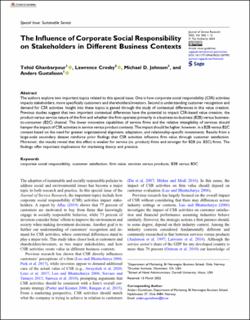The Influence of Corporate Social Responsibility on Stakeholders in Different Business Contexts
Journal article, Peer reviewed
Published version
Permanent lenke
https://hdl.handle.net/11250/3103208Utgivelsesdato
2023Metadata
Vis full innførselSamlinger
Originalversjon
10.1177/10946705231207992Sammendrag
The authors explore two important topics related to this special issue. One is how corporate social responsibility (CSR) activities impacts stakeholders, more specifically customers and shareholders/investors. Second is understanding customer recognition and demand for CSR activities. Insight into these topics is gained through the study of contextual differences in this value creation. Previous studies suggest that two important contextual differences have the potential to impact CSR-based value creation, the product versus service nature of the firm and whether the firm operates primarily in a business-to-business (B2B) versus business-to-consumer (B2C) channel. The lower innovative capabilities of service firms and the relative intangibility of services should hamper the impact of CSR activities in service versus product contexts. The impact should be higher, however, in a B2B versus B2C context based on the need for greater organizational alignment, adaptation, and relationship-specific investments. Results from a large-scale secondary dataset reinforce prior findings that CSR activities influence firm value through customer satisfaction. Moreover, the results reveal that this effect is weaker for service (vs. product) firms and stronger for B2B (vs. B2C) firms. The findings offer important implications for marketing theory and practice.

